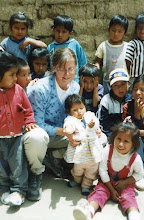
If you are not versed in Spanish and you are looking at the opening photo, you may think that La Cancha has something to do with donkeys. Or it could be a local or indigenous word for an animal. In the dictionary cancha refers to a field or a ground, in sports a playing field or court. But here when one refers to La Cancha with capital letters, they are talking about the market place.
I would think that the use of the word originated from the place that people would gather on market day, using the cobble stoned areas of the plaza or flattened playing fields.
I thought that these donkeys brought items to be sold at the market. It took much observation and a few well placed questions to find out that they are actually milked, and a small portion, maybe about a 1/3 to 1/2 a cup, costs twice what I pay for a liter of milk. It is said to have medicinal or curative purposes.

In Cochabamba La Cancha sprawls for 20 to 30 city blocks and overflows to the surrounding streets as people set up their wares on the sidewalks and gutters of the roads that lead to the market place. Above is one of the major roads early in the morning before the traffic jams start and before the street is strewn with trash.
People set up their wares at the edge of the street. It took a while to get this photo (what photo you say?? sorry to say but the program of blogger deleted it and after working on the post for hours I don't feel like uploading it again!! maybe some other day. The new format is a struggle to work with It was really a good pic.) as the transportation kept going by.The foreground is really a major street, the woman in the tan shawl is in the middle of an island, that is used for a bus stop. In front of her is the road too where the bus will stop at the handrails if someone wants to board.

The man above pushes a load. In the early morning they help the vendors to bring their wares, produce and products to their "puestos" or their point of sale. During the day individuals may contract the men (I have yet to see a woman at this work) to help consolidate purchases and bring them to a bus or taxi to load up. Many guys nap right in their wheelbarrows during the afternoon lull. At the end of the day they are contracted once more to help store unpurchased items until the next day.

You can buy anything in the cancha, and the reputation is that everything is cheaper. I have not found the cheaper part to be true. I have found many things there, but it can take a long time to find it. Things tend to be set up in groups for example veggie section, used clothes section, cleaning supplies, there is even a section just for potatoes and just for bananas.
If my shopping list is eggs, crackers, tomatoes, potatoes, apples, baking powder, laundry soap, T.P., pasta, toothpaste, milk and tuna, I need to go to 12 different sections. After walking about 10 blocks to the first item (actually tuna), I then walk 10-14 blocks more buying items on the way. When I finish, I am about 12-16 blocks away from home and look for a bus to take me to within a block or so of my home. A bit more complicated then going to the supermarket, which I must admit exists here, but many things cost so much more that my food budget would quickly be used.
The parting shot is of another of the busiest roads in the cancha, abet early in the morning before traffic tries to cut it's way through the ever narrowing way, as the vendors inch their way to the center of the street.





No comments:
Post a Comment